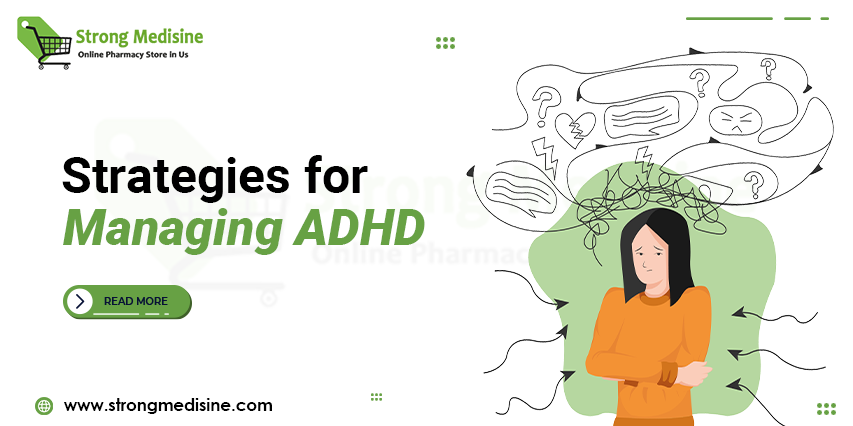
Attention Deficit Hyperactivity Disorder (ADHD) is often seen as a childhood condition, but it can persist into adulthood and pose significant challenges in various aspects of daily life. For adults with, managing ADHD symptoms and navigating the demands of work, relationships, and daily responsibilities can be particularly challenging. However, with effective strategies and support, adults with ADHD can learn to thrive and lead fulfilling lives. In this blog post, we will explore some effective strategies for managing ADHD in adults.
Understanding ADHD in Adults
Before diving into strategies for managing ADHD, it’s important to have a basic understanding of how this condition presents in adults. While the symptoms of ADHD can vary from person to person, common characteristics include difficulties with focus, attention, impulsivity, and hyperactivity. In adults, these symptoms can manifest in various ways, such as difficulty staying organized, chronic forgetfulness, restlessness, and challenges with time management. Additionally, adults with ADHD may struggle with regulating their emotions and maintaining consistent routines.
Effective Strategies for Managing ADHD
Seek Professional Diagnosis and Support
The first step in effectively managing ADHD as an adult is to seek a professional diagnosis. A thorough evaluation by a mental health professional, such as a psychiatrist or psychologist, can provide clarity and guidance. Furthermore, once diagnosed, individuals can receive tailored support and treatment options, such as medication, therapy, and accommodations in various settings.
Develop Routines and Structure
Establishing routines and structure can provide a sense of predictability and stability for adults with ADHD. Creating daily schedules, using planners or digital organizers, and setting reminders can help individuals stay on track and manage their time effectively. Additionally, breaking down tasks into manageable steps and setting clear goals can make it easier to stay focused and organized.
Utilize Behavioral Therapy
Therapeutic interventions, such as cognitive-behavioral therapy (CBT) and mindfulness-based approaches, can be beneficial for adults with ADHD. These therapies can help individuals develop strategies for managing impulsivity, improving attention, and coping with emotional dysregulation. Learning techniques for mindfulness and stress reduction can also be invaluable in navigating the challenges associated with ADHD.
Embrace Exercise and Physical Activity
Regular exercise has been shown to have a positive impact on ADHD symptoms. Engaging in physical activity, whether it’s through sports, yoga, or simply going for a walk, can help reduce restlessness and improve focus. Exercise also promotes the release of neurotransmitters like dopamine and norepinephrine, which are associated with attention and mood regulation.
Utilize Cognitive Aids and Technology
In today’s digital age, there are numerous cognitive aids and technological tools that can assist adults with ADHD. These may include apps designed for task management, digital calendars with reminders, and noise-cancelling headphones to minimize distractions. Utilizing these resources can help individuals stay organized and minimize the impact of ADHD symptoms on their daily lives.
Build a Support Network
Having a strong support network can make a significant difference in managing ADHD as an adult. Whether it’s through friends, family, or support groups, having people who understand and offer support can be invaluable. Additionally, building a network of healthcare professionals, including therapists and support groups specialized in ADHD, can provide ongoing guidance and assistance.
Prioritize Self-Care and Rest
Self-care is crucial for adults with ADHD, as managing symptoms can be exhausting. Prioritizing adequate sleep, healthy nutrition, and stress management techniques is essential. Additionally, engaging in hobbies and activities that bring joy and relaxation can help individuals recharge and maintain a positive mindset.
Conclusion
Although living with ADHD as an adult presents unique challenges, the strategies outlined in this blog can empower individuals to effectively manage their symptoms and lead fulfilling lives. By seeking professional support, implementing routines, utilizing therapeutic interventions, embracing exercise, leveraging technology, building a support network, and prioritizing self-care, adults with ADHD can navigate their daily lives with greater ease and success. With the right strategies and support, individuals can thrive and harness the unique strengths associated with ADHD.
Managing ADHD in adults is indeed a multifaceted journey, but with the right tools and support, individuals can cultivate resilience, adaptability, and success in various domains of life.

Leave a Reply